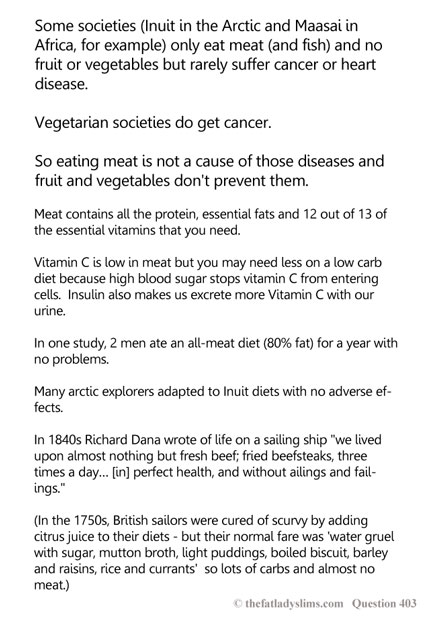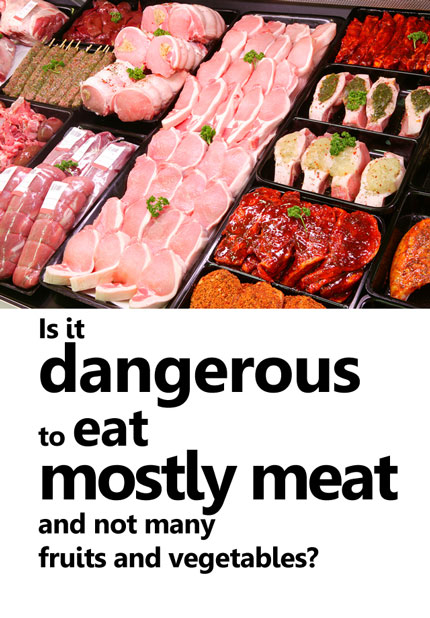
References
"There are traditional populations that ingested a high fat, high protein diet containing only a minimal amount of carbohydrate for extended periods of time (Maasai), and in some cases for a lifetime after infancy (Alaska and Greenland Natives, Inuits, and Pampas indigenous people) (Du Bois, 1928; Heinbecker, 1928). There was no apparent effect on health or longevity. Caucasians eating an essentially carbohydrate-free diet, resembling that of Greenland natives, for a year tolerated the diet quite well (Du Bois, 1928)." Dietary Reference Intakes for Energy, Carbohydrate, Fiber, Fat, Fatty Acids, Cholesterol, Protein, and Amino Acids (Macronutrients)(2005) page 275:
2 men all meat diet: McClellen et al, Prolonged Meat Diets with a study of kidney function and ketosis, Journal of Biological Chemistry 1930
"Even vitamin C, a nutrient commonly associated with fresh fruit and vegetables, was shown to exist in ample quantities in Arctic TF meats" Kuhnlein, H. V., Receveur, O., Soueida, R., & Egeland, G. M. (2004). Arctic Indigenous Peoples Experience the Nutrition Transition with Changing Dietary Patterns and Obesity. J. Nutr., 134(6), 1447–1453.
"..examined the relation between baseline dietary protein and subsequent 4-year change in bone mineral density (BMD) for 391 women and 224 men from the population-based Framingham Osteoporosis Study. ... Mean age at baseline ... was 75 years ... Mean protein intake was 68 g/day ..., and mean percent of energy from protein was 16% (range, 7-30%). .. Lower protein intake was significantly related to bone loss at femoral and spine sites ... Persons in the lowest quartile of protein intake showed the greatest bone loss. Similar to the overall protein effect, lower percent animal protein also was significantly related to bone loss .... women and men with relatively lower protein intake had increased bone loss, suggesting that protein intake is important in maintaining bone or minimizing bone loss in elderly persons. Further, higher intake of animal protein does not appear to affect the skeleton adversely in this elderly population." Hannan, M. T., Tucker, K. L., Dawson-Hughes, B., Cupples, L. A., Felson, D. T., & Kiel, D. P. (2000). Effect of dietary protein on bone loss in elderly men and women: the Framingham Osteoporosis Study. Journal of bone and mineral research : the official journal of the American Society for Bone and Mineral Research, 15(12), 2504–12. doi:10.1359/jbmr.2000.15.12.2504
"Meat consumption is inconsistently associated with development of coronary heart disease (CHD), stroke, and diabetes mellitus.... systematic review and meta-analysis of evidence for relationships of red (unprocessed), processed, and total meat consumption with incident CHD, stroke, and diabetes mellitus... Consumption of processed meats, but not red meats, is associated with higher incidence of CHD and diabetes mellitus." Micha, R., Wallace, S. K., & Mozaffarian, D. (2010). Red and processed meat consumption and risk of incident coronary heart disease, stroke, and diabetes mellitus: a systematic review and meta-analysis. Circulation, 121(21), 2271–83. doi:10.1161/CIRCULATIONAHA.109.924977
"Aging is associated with reductions in muscle mass and strength... and is generally characterized using muscle mass index (MMI). It is believed that adequate nutrition especially regarding protein intake, can delay this progression and enhance the quality of life of elders... We examined whether the predominant source of protein consumed (animal or vegetal) by older women was associated with MMI... Our results suggest that protein intake, especially from animal sources, may be associated with a better preservation of MMI." Lord, C., Chaput, J. P., Aubertin-Leheudre, M., Labonté, M., & Dionne, I. J. (2007). Dietary animal protein intake: association with muscle mass index in older women. The journal of nutrition, health & aging, 11(5), 383–7.
"... examine the relationship between the type of protein intake and the level of muscle mass in healthy omnivorous and vegetarian Caucasian women... an observational and cross-sectional study... animal protein intake ...was the independent predictor of muscle mass index... Thus, a vegetarian diet is associated with a lower muscle mass index than is an omnivorous diet at the same protein intake. A good indicator of muscle mass index in women seems to be animal protein intake" Aubertin-Leheudre, M., & Adlercreutz, H. (2009). Relationship between animal protein intake and muscle mass index in healthy women. The British journal of nutrition, 102(12), 1803–10. doi:10.1017/S0007114509991310
"In this comprehensive review, the currently available epidemiologic prospective studies of red meat intake and colorectal cancer are summarized to provide a greater understanding of any potential relationships. Specifically, salient demographic, methodological and analytical information is synthesized across 35 prospective studies. Collectively, associations between red meat consumption and colorectal cancer are generally weak in magnitude, with most relative risks below 1.50 and not statistically significant, and there is a lack of a clear dose-response trend... the currently available epidemiologic evidence is not sufficient to support an independent positive association between red meat consumption and colorectal cancer." Alexander, D. D., & Cushing, C. A. (2011). Red meat and colorectal cancer: a critical summary of prospective epidemiologic studies. Obesity reviews : an official journal of the International Association for the Study of Obesity, 12(5), e472–93. doi:10.1111/j.1467-789X.2010.00785.x
"Intake of dietary protein, especially from animal sources, may be associated with a reduced incidence of hip fractures in postmenopausal women." Munger, R. G., Cerhan, J. R., & Chiu, B. C.-H. (1999). Prospective study of dietary protein intake and risk of hip fracture in postmenopausal women. Am J Clin Nutr, 69(1), 147–152. Retrieved from http://ajcn.nutrition.org/content/69/1/147.short
"... examine the association of red meat, processed meat, and poultry consumption with the risk of early death in the European Prospective Investigation into Cancer and Nutrition (EPIC)...448,568 men and women ..higher all-cause mortality remained significant only for processed meat ...Significant associations with processed meat intake were observed for cardiovascular diseases, cancer, and 'other causes of death'."Rohrmann, S., Overvad, K., Bueno-de-Mesquita, H. B., Jakobsen, M. U., Egeberg, R., Tjønneland, A., … Linseisen, J. (2013). Meat consumption and mortality--results from the European Prospective Investigation into Cancer and Nutrition. BMC medicine, 11, 63. doi:10.1186/1741-7015-11-63
"To estimate the summary association between red meat intake and [colorectal cancer] CRC and to examine sources of heterogeneity, a meta-analysis of prospective studies was conducted... The available epidemiologic data are not sufficient to support an independent and unequivocal positive association between red meat intake and CRC. This conclusion is based on summary associations that are weak in magnitude, heterogeneity across studies, inconsistent patterns of associations across the subgroup analyses, and the likely influence of confounding by other dietary and lifestyle factors." Alexander, D. D., Weed, D. L., Cushing, C. A., & Lowe, K. A. (2011). Meta-analysis of prospective studies of red meat consumption and colorectal cancer. European journal of cancer prevention : the official journal of the European Cancer Prevention Organisation (ECP), 20(4), 293–307. doi:10.1097/CEJ.0b013e328345f985
Blogpost: Dr Georgia Ede on Vegetables
Nutrition Facts: Beef
Photo
Jim McCarthy, bigstock.com











